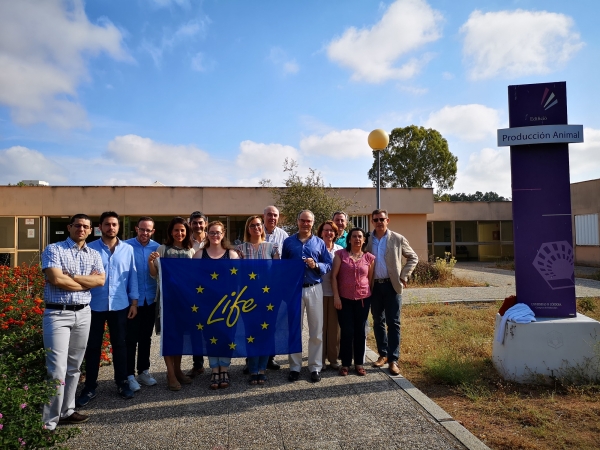If we are going to discuss extensive livestock farming, we are going to talk about balance and conservation in the ecosystems where it takes place. This is a system that, within a variety of versions, tries to produce sustainably on land that essentially does not allow for other kinds of production and where animals feed on the resources provided by the environment on sprawling acreage. Extensive livestock farming enhances biodiversity, stabilizes the population, produces food with high value added, fixes carbon in soil and prevents fires, meaning that its benefits go beyond obtaining meat products. For complete sustainability, the only thing missing is greater profitability along with better marketing and product differentiation.
Despite its social relevance, extensive livestock farming is currently undergoing a hard crisis, especially in southern Europe, where some of the effects of climate change are being more overwhelmingly displayed. Increasing dryness, due to scarce rainfall and increasing temperatures, reduces pasture production, the key to feeding extensive livestock and that only has value as a resource when grazing is done in pastures. With fewer pastures, the system is weakened, productivity decreases and costs rise.
The international project LiveAdapt – ‘Adaptation to Climate Change of Extensive Livestock Production Models in Europe’- (LIFE17 CCA/ES/000035), aims to adapt extensive livestock farming to climate change by means of technology and innovative practices that allow for the sector’s adaptation to this problematic scenario. The interdisciplinary team, led by UCO Animal Production Department researcher Vicente Rodríguez Estévez, is made up of entities based in France, Spain and Portugal and framed within the European Union program ‘LIFE17 Climate Change Adaptation’, an instrument that supports environmental conservation and climate action projects.
In addition to coordinating the entire project, which is halfway finished, the University of Cordoba is also leading some specific work packages: assessment of pasture productivity, prevalence of parasites and the condition of coprophagous fauna populations, as well as some pasture improvement trials with short cycle legumes and alternative antiparasitic treatments. Add to that the proposal for new business models and policies that support extensive livestock farming, which will allow for placing value on its role as an environmental conservator and mitigator of climate change, in order to improve the financial feasibility of these systems; also with the support of the innovations developed by the team, such as an app that manages farming operations. In short, the idea is to reinforce the sustainability of livestock farming that benefits all of society, regardless of whether everyone consumes these products or not.
The sector’s needs are being identified and better practices to adapt to climate change are being sought, innovating some of the already existing ones. Some of the project’s actions are moving toward better technology in order to make better use of water with water provisioning systems, by reducing evaporation and making better use of water, and designing management tools for farms based on online information from the farm itself, GISs and weather databases, that will help in decision making as well as in forecasting. Other actions aim to improve the balance of pastures and increase their ability to fix carbon.
Education, the key to sustainability
After the first stage of identifying good practices, the different teams are drawing up a series of data sheets in order to make the different measures that will allow for adapting extensive farms to climate change known. The data sheets cover several topics, from making the most of vegetation to managing livestock when grazing, while also covering water management and antiparasitic treatments. These good practice sheets will be the foundation for carrying out the MOOC course that the University of Cordoba will place in its Virtual Classroom on the Moodle platform. This educational program will start up in the last months of the project, in the form of five courses that will begin in January 2021. They will be of varying degrees of difficulty and will be mentored by technical staff of the Life project.
With the aim of the results having an impact on agricultural policy, to support these practices as well as a greater regard for extensive livestock farming, all the improvements will be transferred by means of reports, workshops, meetings, a web project and the aforementioned educational activities.
The LIVE ADAPT project -“Adaptation to Climate Change of Extensive Livestock Production Models in Europe” (LIFE17 CCA/ES/000035) is cofunded by the European Union under the LIFE 2017 CCA call and by the University of Cordoba (Spain).
This article is part of the communication strategy designed by the International Project Office to divulge the international projects granted to the University of Cordoba.
Â


